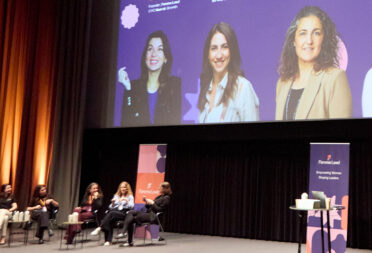Work your focus (remotely) with Laurel Farrer
Focus is a muscle. Laurel Farrer, CEO of Distribute Consulting, tells us how to work it (from home).

Focus is a muscle. And Laurel Farrer knows exactly how to work it (from home). The CEO of Distribute Consulting has developed a full-proof approach to productivity and wellbeing for remote workers – a project that started before the pandemic.
Laurel is a flexibility expert and pioneer of virtual organisational development who founded the now internationally-renowned consulting firm Distribute back in 2018, after 10 years of experience in the sector. She developed her organisation with the goal of empowering business and government leaders to start, strengthen, and leverage virtual workforces to solve corporate and socioeconomic concerns, from job accessibility to sustainability. A big program – but one she believed in “before it was cool”.
“Sometimes I’m praised for my foresight, but before the pandemic, remote work wasn’t the viral, exciting topic it is now. In fact, my advocacy for it was publicly mocked by inspiring brands like Google, Slack, and LinkedIn – who now, ironically, capitalise on their support of flexibility.
“We’ve come a long way since then, but we still have an incredible amount of work to do in advocating for the universal credibility, value, and accessibility of workplace flexibility around the world.”
We asked Farrer about her thoughts on focus, and why wellbeing comes first for effective remote workers.

Be your own manager
Working remotely can seem exciting – and it is. But it also requires a good dose of autonomy. Farrer calls it “workplace independence.”
“Workplace independence means that our productivity is not dependent on a specific location. In other words, that work is something that we do, not somewhere that we go. It still needs to be supervised even when we work remotely.
“So, if a manager isn’t going to be in close proximity to do that, then the weight of supervision and accountability falls onto the workers themselves. If we truly want to be independent in our schedule and autonomy, then we have to be fully responsible for the consistency, productivity, and quality of our results and time in order to earn that freedom.”
Set up for success
Farrer believes a better desk setup can help improve focus and concentration. Starting with decluttering.
“Albert Einstein once famously said, ‘If a cluttered desk is a sign of a cluttered mind, of what, then, is an empty desk a sign?’ but I couldn’t disagree more. Early in my career, I studied and worked on the psychology of interior design. It’s undeniable that our environments have a profound influence on our cognitive results.
“To me, a tidy desk, clean workspace, fresh air, natural light, and ergonomic seating is the perfect recipe for concentration and creativity. Otherwise, we’re just likely to feel distracted, overwhelmed, and discouraged.”

Identify your focus style
There are different focus styles. Identifying yours will help you develop an organisational system that works for you when working remotely. So, are you a diver or a pacer?
“Some people prefer to go heads down into deep work and not come up for air until they’re done with the project. Other people need frequent breaks in order to stay refreshed and energetic mentally. There is no right way or wrong way to be productive — it’s about figuring out what works best for you uniquely.
“Remote workers don’t necessarily need to be type-A organisational gurus to be successful, but they do need to have successful personal time and task management systems in place to keep themselves paced and accountable.”
Block time strategically
Stop mixing and matching your tasks all day. Playing building blocks with your time can be an effective way to stay focused and keep on top of your projects.
“Time blocking is a critical strategy for many professionals. Reserve certain amounts of time each day for checking and responding to messages and another block of time for personal administration – like updating your to-do list and managing your calendar. Then allocate the rest of your day to meetings and/or deep work time.
“The more each type of task is clustered together into a single block, the more efficient your cognitive processes can be because you’ll spend less time toggling between different categories and getting into and out of different types of headspace.”
Silence those notifications
Don’t let that little red dot distract you. Staying connected can be important, but focus and concentration are too.
“The apps and devices we use are literally designed to track and solicit our attention. If we haven’t been active for a certain amount of time, the software will automatically send us a notification or activate a screen to bring us back as an active user. Our attention is their revenue.
“So, we have to be extremely proactive and disciplined in establishing control over our devices – instead of letting them control us. Dive deep into the account settings of every single app and software you use on your phone and laptop to make sure that you’re only getting nudged as often as you absolutely need.”
Go offline
For Farrer, the beauty of working remotely is that you can truly find your quiet place. Even if it’s at the top of a mountain.
“One of the best parts of remote work is that you don’t have to work from a certain location. So, I will often take this opportunity to the extreme, and instead of just working from my home office, I’ll download all of the materials I need for a project, notify my team members about my availability, then go into offline mode for a few hours and work from unusual locations.
“My favourite is when I need some deep thinking or introspective writing, I might hike to a mountain top and work somewhere isolated with a scenic view.”
Don’t fall into the burnout trap
One of the traps Farrer warns us against is burnout. Without a clear separation between work and personal life, it’s easy to overdo it.
“Managing both your personal and professional lives in the same space requires extreme discipline and mental compartmentalisation. It’s challenging not to have the physical separation between work and hobbies or relationships, because the geographic space is a cognitive representation of creating mental space between the two.
“Over time, poor separation of the two when working from home can snowball into overworking, neglecting household responsibilities, avoiding social relationships, underperforming on work tasks, and deprioritising self-care. It’s a slippery slope, but it is possible to thrive with strong time and task management systems.”

Put your wellbeing first
At the end of the day, taking care of your health is the most important to stay focused and productive without pushing yourself too far.
“Maslow’s hierarchy of needs is one of the most famous models in psychology, and for good reason. It explains that humans can only progress to thinking about ‘non-essential’ needs – like creative ideas and personal confidence – after their fundamental needs are met – like food, shelter, love, and safety.
“The same principle applies to our daily productivity. If we’re not taking care of our essential needs like eating healthy food, getting exercise, and nourishing relationships with loved ones, then we’re going to have a much harder time performing effectively at work, both psychologically and physiologically.”
Stay focused and hydrated all day long with MOO Water Bottles.
Keep in touch
Get design inspiration, business tips and special offers straight to your inbox with our MOOsletter, out every two weeks.



